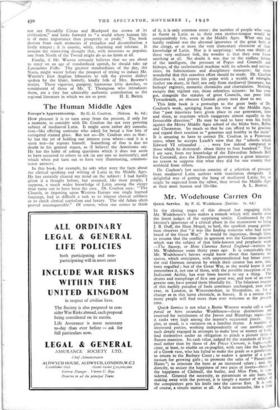The Human Middle Ages
Europe's Apprenticeship. By G. G. Coulton. (Nelson. 8s. 6d.) How pleasant it is to turn away from the present, if only for a moment, to consider with Dr. Coulton the not very pressing subject of mediaeval Latin. It might seem rather dry consola- tion—like offering someone who asked for bread a few bits of variegated stained glass. But not so—Dr. Coulton sees to that : he has the art of holding our interest even where—and it is a stern test—he repeats himself. Something of that is due no doubt to his general stance, as (I believe) the Americans say. He has the habit of asking questions which it does not seem to have occurred to others to ask (at any rate so insistently), and which when put turn out to have very illuminating, common- sense answers.
In this book, for example, he asks what were the facts about the clerical speaking and writing of Latin in the Middle Ages. He has certainly cleared my mind on the subject : I had hardly given it a thought before, but assumed, like most people, I suppose, a much wider knowledge of Latin among the clergy than turns out to have been the case. Dr. Coulton says : " The Church, in imposing upon Western Europe one single learned language, had as difficult a task as to impose clerical celibacy or to check clerical capitalism and luxury. The old Adam often proved unconquerable." Of course, when one comes to think of it, it is only common sense : the number of people who were as fluent in Latin as in their own mother-tongue would be comparatively few, even in the Middle Ages. What one had hardly realised was the abysmal ignorance of the great bulk of the clergy, or at most the very elementary character of their knowledge of Latin. Nor is it surprising : when one thinks of these very ordinary folk, the wonder is that they ever know anything at all. No doubt it was due to the endless labour of the intelligent, the pressure of Popes and Councils and bishops, of the ecclesiastical machine with its schools and univer- sities, its fulminations and disciplinary measures: far more wonderful that this ceaseless effort should be made. Dr. Coulton illustrates it, and proves his point with a wealth of examples (rather too many, in fact) not only from mediaeval literature, but bishops' registers, monastic chronicles and chartularies. Nothing escapes that vigilant eye, those relentless scissors : he has even got, alongside the statutes of great Councils, our poor little Tywardreath, an obscure Cornish priory next door to me.
This little book is a postscript to the great body of Dr. Coulton's work, springing from his view of the Middle Ages, that " past injustices have given place in our generation, here and there, to reactions which exaggerate almost equally in the favourable direction." He may be said to have won his battle against the Merry Middle Ages school of the blithe boys, Belloc and Chesterton. So much so that he can afford to be gracious and regard their reaction as " generous and healthy in the main." It is amusing to have to correct Dr. Coulton in a Protestant sense, when he accepts Leach's view that the " schools which Edward VI refounded . . . were few indeed compared to those which he destroyed : about thirty to four hundred." That I am sure, from my knowledge of the Edwardian Schools Roll for Cornwall, does the Edwardian government a great injustice: no reason to suppose that what they did for one county they withheld from others.
Dr. Coulton's last section consists of a selection of passages from mediaeval Latin authors with translation alongside. A delightful way of getting the hang of mediaeval Latin; for, as might be expected from the editor, they reveal the Middle Ages at their most human and life-like. A. L. ROWSE.






































 Previous page
Previous page